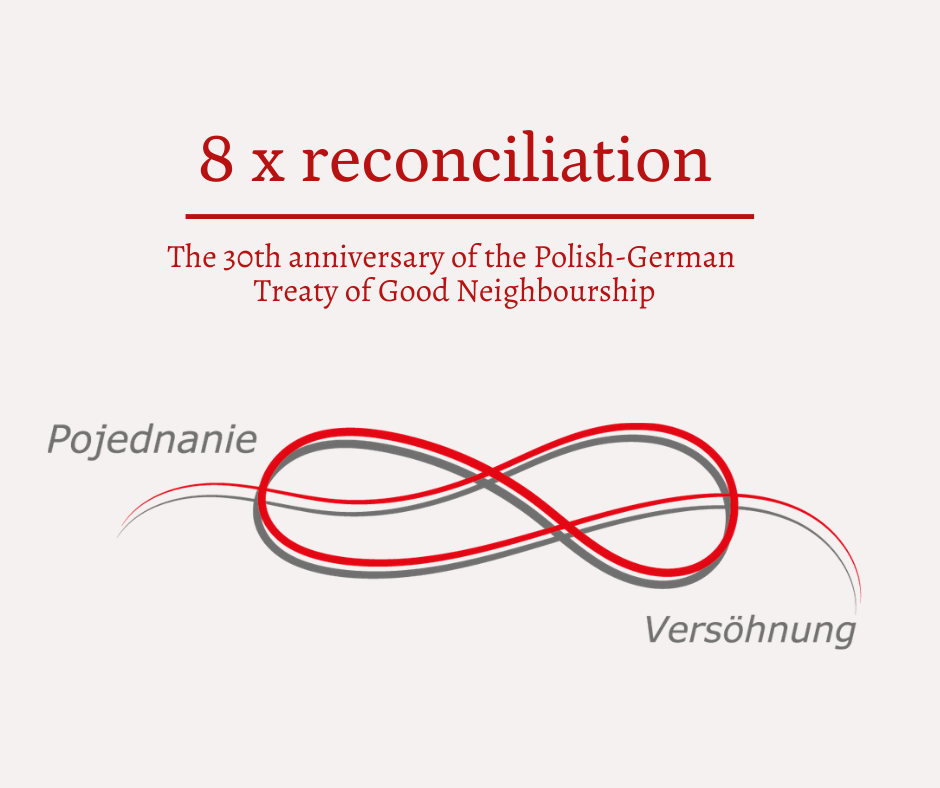 On 17 June 1991 the "Treaty of Good Neighbourship and Friendly Cooperation" was signed between Poland and Germany. In it, both sides expressed their conviction "of the need to overcome the division of Europe once and for all and to create a just and lasting peace in Europe", and committed themselves to realising the long-standing desire of both nations for understanding and reconciliation.
On 17 June 1991 the "Treaty of Good Neighbourship and Friendly Cooperation" was signed between Poland and Germany. In it, both sides expressed their conviction "of the need to overcome the division of Europe once and for all and to create a just and lasting peace in Europe", and committed themselves to realising the long-standing desire of both nations for understanding and reconciliation.
The Treaty on Reconciliation
The treaty mentions reconciliation eight times. Reconciliation is linked here to various aspects of German-Polish relations. The treaty postulates various forms of cooperation between the two nations to promote reconciliation and to ensure that it lasts, including a shared responsibility of Germans and Poles for peace in Europe, regional cooperation, cooperation in areas as diverse as the economy, cultural exchange or the promotion of people-to-people contacts between Germans and Poles, in which youth exchange plays a special role.
But what does "reconciliation" mean in the context of overcoming political conflicts? This is an extremely difficult question. Those involved in the process of German-Polish rapprochement have rarely attempted to define the concept of reconciliation. They were rather preoccupied with the question of what concretely could and should be done to achieve reconciliation in practice. They also did not have ready-made solutions at their disposal, but had to discover slowly or even work out from scratch many aspects of reconciliation by learning by doing. On the basis of their experiences, the particular dynamics of German-Polish reconciliation can be seen in retrospect. Let us recapitulate it in the following nine theses.
What is reconciliation? Nine theses
1. Reconciliation between conflicted nations is always a long and arduous process that is by no means linear – obstacles and failures are just as much a part of it as progress in mutual rapprochement. This was also the situation with German-Polish reconciliation.
2. Spontaneous actions are rarely sufficient for lasting reconciliation. Rather, reconciliation requires the parties involved to reflect systematically on the foundations of their own actions in the given political and social context. Many intellectuals and publicists have been involved in initiatives for German-Polish reconciliation, reflecting on the causes of the German-Polish conflict, possible forms of peaceful coexistence between the two nations and concrete actions in politics and the public sphere, and disseminating them in books, journalistic texts or memoranda.
3. In addition to reflecting on the current situation, reconciliation also presupposes well-founded knowledge about the painful past and about the other side of the conflict. For this reason, reconciliation initiatives in the German-Polish context were linked to concrete educational work.
4. However, knowledge of what happened and getting to know one another are only preconditions for reconciliation. Above all, reconciliation takes place through personal encounters.
5. On the background of the different languages, experiences and mentalities of Germans and Poles one thing becomes clear: reconciliation requires translation (not only on the level of language, but also in the form of cultural mediation), so that the parties involved can understand, communicate and – ideally – empathise with each other.
6. This empathy with the other side, the recognition of their sensitivities and needs, leads to concrete measures in the spirit of reconciliation. In the German-Polish context, three main types of such actions can be distinguished: gestures expressing the will for reconciliation; acts of reparation for the harm done; commemorating events that are regarded as milestones of reconciliation in order to symbolically seal the achievements made so far on the path of reconciliation and to affirm them as a commitment for the future.
7. Christian-motivated reconciliation initiatives can have a positive impact on politics, as was also the case in the German-Polish rapprochement.
8. One of the greatest challenges of reconciliation is to convey its relevance and meaning to generations who have no personal experience of the Second World War and its consequences. Reconciliation is therefore not a state of affairs that can be achieved once and for all, but in its intergenerational dimension it becomes an ongoing task and a responsibility for the future.
9. Finally, German-Polish reconciliation has a pan-European significance that goes beyond the context of bilateral German-Polish relations. It should not be forgotten that both world wars began as local conflicts. Therefore any action that overcomes or prevents local conflicts also serves the rest of Europe. This is the spirit in which the Krzyżowa Foundation for Mutual Understanding in Europe operates, transferring the experience of German-Polish reconciliation to other international contexts.
What does German-Polish reconciliation teach us?
The experience of German-Polish reconciliation shows that reconciliation is based on many actors from the Church, politics, society and depends on many factors. It is precisely this multidimensionality that gives hope for the success of reconciliation in the long term – even in the face of tensions in bilateral relations. German-Polish reconciliation seems to be lasting precisely because it is so diverse and dynamic.
________
Dr. Urszula Pękala, a theologian and Church historian, Deputy Head of the Memorial Site at the Krzyżowa Foundation, has researched German-Polish reconciliation in its political, religious and social dimensions for several years. The present text is based on the results of this research. More on this topic e.g. in: Urszula Pękala, Irene Dingel (eds.), Ringen um Versöhnung. Religion und Politik im Verhältnis zwischen Deutschland und Polen seit 1945 [Struggling for Reconciliation. Religion and Politics in Polish-German Relations after 1945] (VIEG Beihefte 116), Vandenhoeck & Ruprecht: Göttingen 2018.



